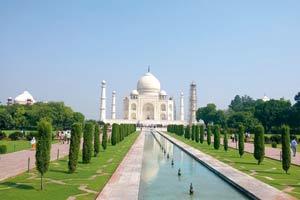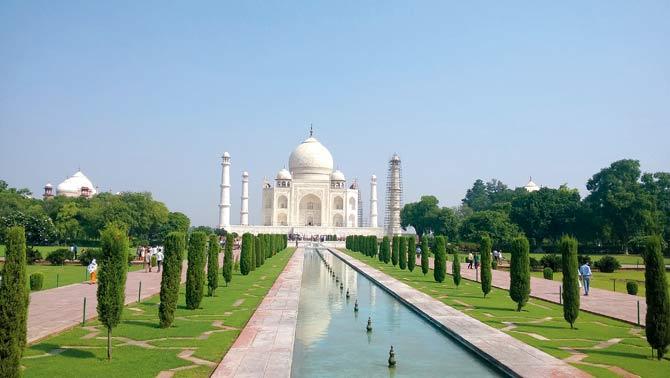Govt representatives take it upon themselves to define what being Indian means. Their version is almost always furthest from the truth


UP Chief Minister Yogi Adityanath had said foreign dignitaries visiting India were now being given copies of Gita and Ramayana instead of replicas of the Taj Mahal, which does not reflect Indian culture. File pic
 You can't be homosexual, wear shorts, hold your partner's hand, celebrate your birthday, take someone to dinner on Valentine's Day, step out after dusk if you're female, chat with a man in public if you're female, celebrate the presence of the Taj Mahal, hug a woman in public or kiss anyone anywhere outside your home. All of these things have been deemed alien to our culture, by various men and women who, thanks to us, have been given platforms to spread their dim-witted ideas.
You can't be homosexual, wear shorts, hold your partner's hand, celebrate your birthday, take someone to dinner on Valentine's Day, step out after dusk if you're female, chat with a man in public if you're female, celebrate the presence of the Taj Mahal, hug a woman in public or kiss anyone anywhere outside your home. All of these things have been deemed alien to our culture, by various men and women who, thanks to us, have been given platforms to spread their dim-witted ideas.
ADVERTISEMENT
With every week that passes by, some MP or MLA takes it upon himself or herself to tell the rest of us what being Indian really means, and what we can and can't do. They all have very specific notions of what our culture is supposed to represent.
What is Indian culture anyway? If we go by how our elected leaders behave, assaulting and abusing other MPs in Parliament must be part of our culture. Threatening government employees for doing their jobs must be part of our culture. Refusing to stand in line or eat food that isn't subsidised by taxpayers must be part of our culture. Demeaning women in public and rewriting textbooks that don't fit in with our half-baked ideas of history must be part of our culture. Millions of us must simply toe the line and go by what these people say, simply because they have spent more time on WhatsApp than they have in school.
A few days ago, 10 girls from a Kolkata school were accused of indulging in homosexual activities, after which an education minister promptly spoke about lesbianism not being part of our culture. Putting aside the humiliation these young people must have been put through, and the trauma inflicted on them as well as their families, it boggles the mind that people supposedly in charge of framing our country's education policy consistently end up being the most regressive among us. It's as if our political parties go out of their way to find the least educated, least qualified people among us, and promptly offer them the post of Minister of Education whenever possible.
Not too long ago, another minister - this one supposedly in charge of culture - informed the press that girls wanting a night out may be okay elsewhere, but was not part of Indian culture. This notion that a woman's place is at home, by her husband or father's side, continues to be passed down from one generation to another like a tumour for which no cure exists.
It's important for us to ask ourselves what Indian culture really means, because our answers define the message we give to younger members of our own families. Who is the custodian of what my culture is supposed to be? Should I eat something and avoid something else because someone in Delhi believes he or she has the right to control my eating habits? Should the women in my family wear government-approved clothing? Do I have sex with a man or woman depending on what my government thinks is acceptable?
A number of people have taken it upon themselves to prevent the rest of us from celebrating birthdays now, or wishing each other a Happy New Year, because they believe it isn't something we should be doing. The Taj Mahal doesn't reflect our culture either, says another minister, who wants us to stop taking pride in a monument that has brought visitors to our country for centuries.
I don't know what the current definition of Indian culture is. All I know is that, growing up in Bombay once meant I could celebrate every festival I wanted, spend time with anyone I chose to irrespective of my or their religious beliefs, and revel in the fact that I belonged to a country with the capacity to take on every belief, language, cuisine and colour on Earth and make it part of its own. I went to a school that encouraged us to be friends with everyone else, speak all their languages, share their food and greet them on all their festivals.
When we think about what defines culture these days, the only thing we should ask ourselves regularly is this: What sort of India do we want to leave for those who come after us?
When he isn't ranting about all things Mumbai, Lindsay Pereira can be almost sweet. He tweets @lindsaypereira. Send your feedback to mailbag@mid-day.com
Catch up on all the latest Mumbai news, crime news, current affairs, and also a complete guide on Mumbai from food to things to do and events across the city here. Also download the new mid-day Android and iOS apps to get latest updates
 Subscribe today by clicking the link and stay updated with the latest news!" Click here!
Subscribe today by clicking the link and stay updated with the latest news!" Click here!







